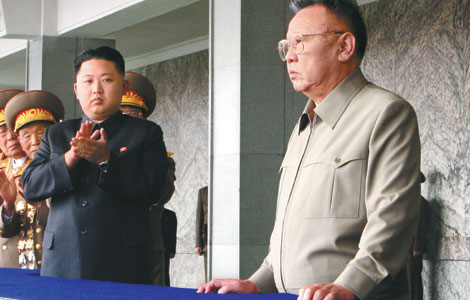|
|||||||||||
BEIJING - The immediate impact of Kim Jong-il's sudden death on relations between China and the Democratic People's Republic of Korea (DPRK), regional stability and the transition of power in the DPRK would be limited, analysts said.
As far as Pyongyang's dynamics with the outside are concerned, Kim's demise will not undermine China-DPRK relations, said Zhang Tingyan, a former Chinese diplomat to Pyongyang who later became China's first ambassador to the Republic of Korea (ROK).
"It should develop at a relatively proper pace. I don't see too many difficulties ahead, let alone radical changes - a peaceful transition is good (for everyone), and that's what will happen, overall, for the DPRK's relations with the ROK, the US and Japan. Of course, we can't rule out contingencies," Zhang said.
The arrangements regarding the transfer of power prior to Kim's death made "the future path of DPRK politics fairly clear", said Liu Jiangyong, vice-dean of the Institute of Modern International Relations at Tsinghua University.
The late DPRK leader was appointed to his first major post as secretary of the Workers' Party of Korea (WPK) Central Committee in 1973. He succeeded his father and DPRK founder Kim Il-sung as the country's top leader in 1994, when the senior Kim died. Kim Jong-un, Kim Jong-il's son and successor, though, emerged on the political scene only last year.
A crucial part of Kim Jong-il's legacy was to build the DPRK into a "Strong and Prosperous Nation" by April 2012, the centenary of the birth of Kim Il-sung on April 15, 1912.
Domestically, observers say immediate measures must be taken to push the DPRK's economy forward. Pyongyang's total grain production this year is estimated at about 4.74 million tons, short of the 6-million-ton annual minimum estimated by food experts.
The DPRK said that its economy is self-supporting, and Pyongyang's KCNA news agency said earlier this year that the nation "is at the highest tide of its development ever in history".
"The issue of primary concern now is not whether the DPRK will maintain political stability, but what will be the nature of the new political leadership, and what policies will it pursue at home and abroad," Zhu Feng, a professor of international relations at Peking University who specializes in East Asian security issues, was quoted by Reuters as saying.
"In the short-term, there won't be new policies, only a stressing of policy stability and continuity. So soon after Kim Jong-il has died, no leader will say that an alternative policy course is needed," Zhu said.
The DPRK's tense relationship with the United States and the ROK started to ease prior to Kim Jong-il's demise, and the new leadership is bound to continue that drive "according to the policies stipulated by Kim Jong-il", said Yang Xiyu, a researcher at the China Institute of International Studies.
Liu in Beijing said it is time for Washington and Seoul to improve relations with Pyongyang.
"I think the DPRK side will still stick to its original stance. The denuclearization of the Korean Peninsula was stressed by Kim Il-sung when he was alive; the unconditional resumption of the Six-Party Talks, too, was iterated many times by Kim Jong-il," said Zhang, the veteran diplomat.
"The talks may not be immediately resumed - they'll likely be postponed by Kim Jong-il's demise - but things will move in the direction of resuming negotiations," he said.
The Six-Party Talks on the DPRK nuclear issue started in 2003 and became bogged down in 2008. The DPRK pulled out in 2009, but expressed willingness to return to the negotiating table in recent months. The negotiations involve the DPRK, the ROK, China, Russia, Japan and the US.
There will also be a period of mourning, perhaps for several months, during which many of the DPRK's international activities will be suspended, said Charles K. Armstrong, director of the Center for Korean Research at Columbia University.
The Six-Party Talks will most likely not resume for a few months at least. All eyes will be watching Pyongyang to see who takes charge and what the DPRK will do next, Armstrong said.
Chen Weihua in New York contributed to this story.
Hot Topics
HIV/AIDS, Egypt protest, Thanksgiving, climate change, global economic recovery, home prices, high-speed railways, school bus safety, Libya situation, Weekly photos
Editor's Picks
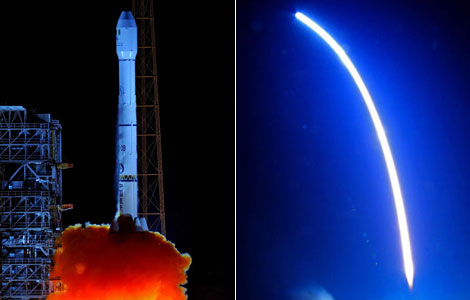
|

|
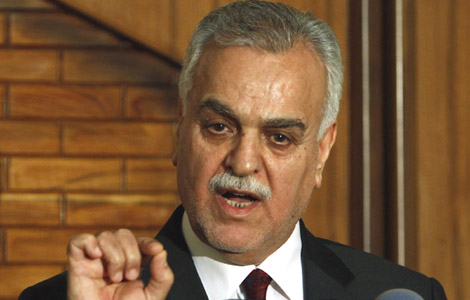
|
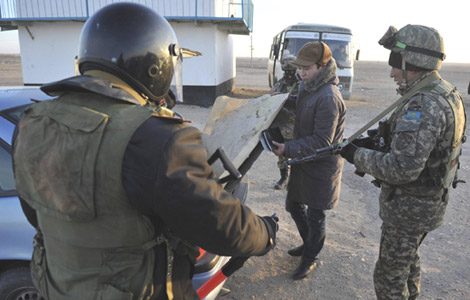
|

|
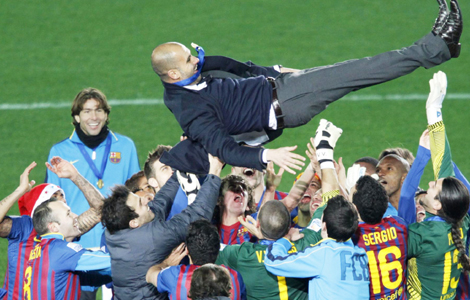
|




